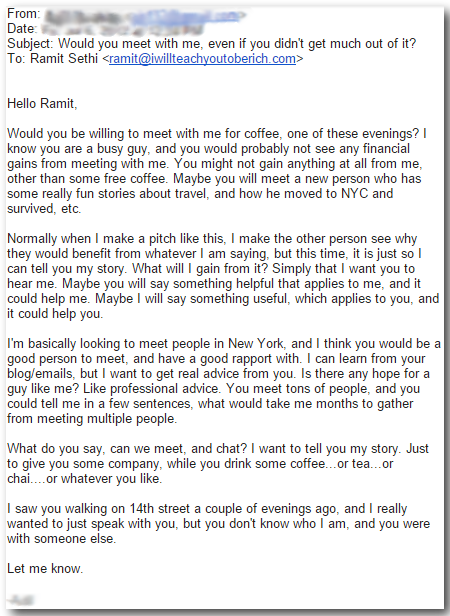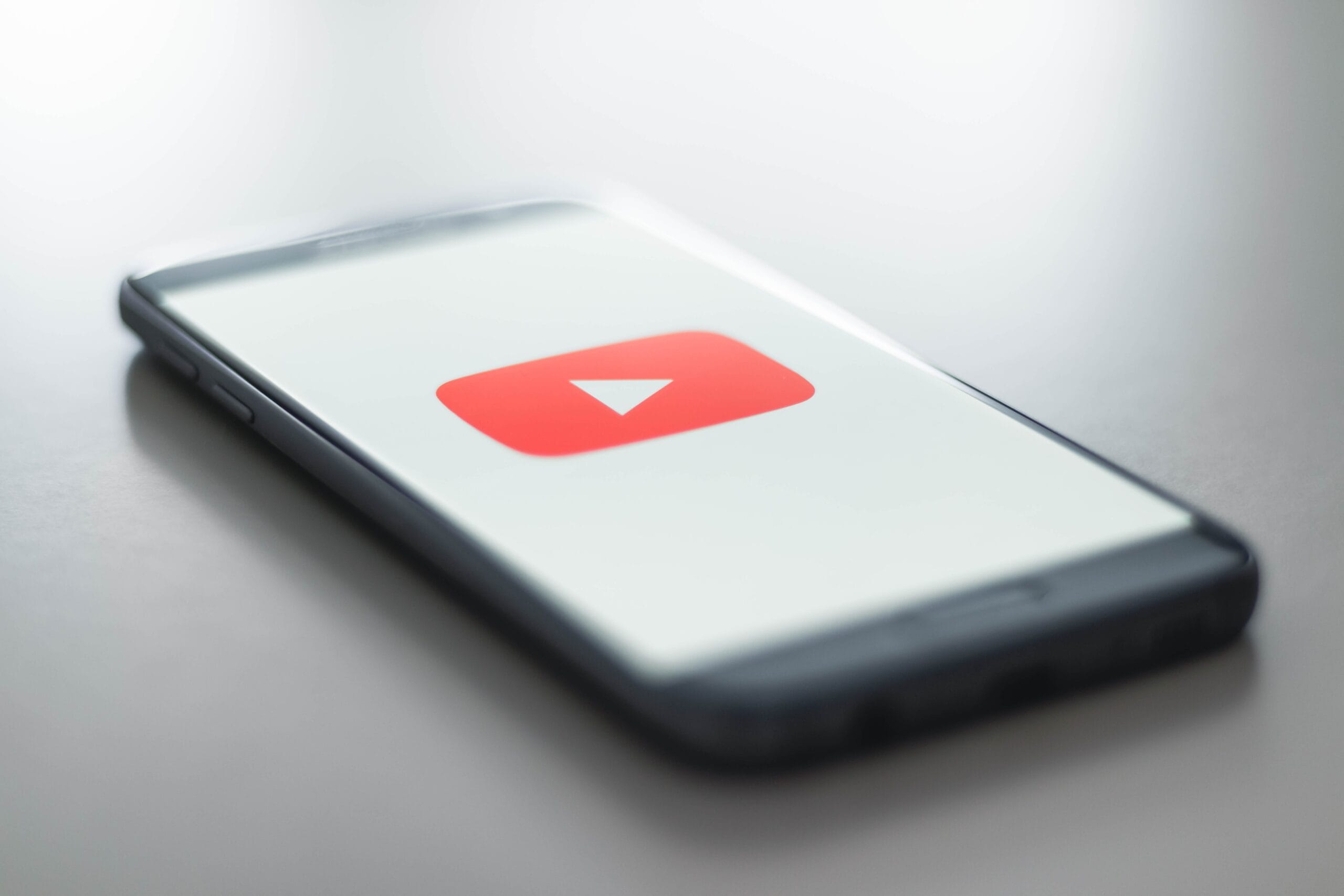
How To Connect w/ Busy People (& Actually Get HAPPY Replies)
Its no secret that connecting with the right person can skyrocket your success — a new job, a boost for your business, or experienced perspective that changes everything. But the right person often has a packed schedule and seemingly endless demands on their time. So how do you connect with these busy people?
Despite how it seems, busy people do not have an impenetrable force field separating them from the normal people.

But they are more selective about how they spend their time. (In fact, you should be more selective with your time, too.)
Most people think connections to important people come from being sleazy, slimy, and scammy. They imagine the slick-haired business guy flitting around a networking event, handing out business cards, then winking and saying, Catch ya later!
Wrong, wrong, wrong.
The first thing you’ll notice is that it’s far more powerful to spend a week trying to meet with one person than a week trying to go to random networking events. In this case, less is more is true it’s far more effective to focus on meeting interesting, relevant people than to blindly throw your business cards into the wind. I don’t even have business cards.
Today we’ll cover the 3 steps to connect with busy people:
- How to get busy people to meet with you
- What to say when you meet a busy/important person
- How to follow up so busy people don?t forget you
Plus, I’ll share My 5 Word-for-Word Scripts to Write Emails That Get Results.
1. How to get busy people to meet with you
If you’re curious about how to actually get the attention of VIPs, DON’T do this:

Notice that in the second paragraph, he actually acknowledges that he should focus on ME (the busy person)and then he does exactly the opposite!
You can start by focusing on simply sending a Hey, I noticed you’re doing really interesting stuff note.
I started doing this in high school. I would be reading a magazine and see an interesting piece about somebody doing something cool. I would just send them an email saying, Hey I read about you in Wired. That is really cool, and I’ll be following your work.? It turns out that even after being covered in national press, most people don’t get nice emails like that where the person emailing doesn’t want something from them.
Later, in college, I would find interesting professors and email them to ask them more about their work. Usually, they would tell me to visit them at office hours, and that’s how I got lots of mentors and advisors.
(One key thing you can ask in meetings with VIPs is: Who else should I be talking to?? If you’ve impressed them, they won’t just suggest people ? they’ll often introduce you themselves.)
Let’s say you’re interested in the fashion world. You want to become a designer. Where should you start?
Would you email Calvin Klein? No, a top-tier designer gets hundreds of emails a day from people wanting things from them.
Start with someone more approachable perhaps a fashion blogger or a freelance writer. They know the space, have connections, and can help you understand the lay of the land. Notice that this is the hard work I talked about. If it were simply as easy as emailing Calvin Klein (or whoever) to get a meeting, everyone would do it.
Brainstorm a list of 10 people you’d like to connect with. Start with these people: People who have a job title you’re interested in learning more about. People who work at companies you’re interested in potentially working at. And people who are doing interesting things you want to learn more about (e.g., you read about them in a magazine/blog post).
Get their email address. If you can’t find this, you fail at life. But you read this site, so I suspect you’re cool.
Notice how these are win-win for everyone. You’re not taking advantage of anyone. You’re not scamming people (a common invisible script when it comes to networking). What you ARE doing is adding value first even if you don’t have money or valuable connections.
I’ve provided my 5 Word-for-Word Scripts to Write Emails That Get Results at the bottom of this post.
How did people reach out to me successfully?
Many people have reached out to me. Some of them stood out, a few met with me, and I’ve even helped some find jobs (or even hired them myself). By the way, I’m not that important, but I’m just using myself as an example of someone who gets a lot of emails/day (1000+) so it’s challenging to reach me. Here’s what the winners did right:
- They reached out through a warm contact. If they didn’t have one, they spent the time to find one by studying who I know. (The info is out there. Facebook, Twitter, 8 million pages I’ve written, the Acknowledgements page of my book. And this isn’t just about me, it’s about any busy person you want to meet.)
- They explained any similarities we had. An alum reaches out to me who seems genuine? I’ll almost always take a phone call or, if convenient, a coffee meeting. Maybe they grew up in my hometown or went to my high school.
- They reached out with a BRIEF, CONCISE EMAIL. I will show you the exact words to use below so you don’t instantly eliminate yourself.
As a result, many of these people stood out among tens of thousands of others who left comments/emails/tweets.
…but you don’t have to take the same path as everyone else. How would it look if you designed a Rich Life on your own terms? Take our quiz and find out:
2. What to say when you meet a busy/important person
Not only do the very best top performers have an uncanny ability to reach extremely busy people, but they can turn a one-time meeting into a long-term relationship. And over time, that is worth more than almost any technical skill or amount of experience.
Once you set up a meeting, there are a couple of key pointers to make the meeting a success:
1. ASK INSIGHTFUL QUESTIONS Don’t waste someone’s time with questions you could easily answer with Google. It’s disrespectful and hurts your chances of making a connection with the person.
Good question: I noticed you did XYZ. It’s interesting because [INSERT NAME OF VIP] took a different approach and did ABC. What was your thinking behind that decision??
Bad question: I’m so unhappy at my job. I think I’d like to do what you’re doing. What does someone in your position do again??
In this video, I put together a few more examples of insightful questions to keep the conversation going:
2. SPEND 90% OF THE INTERVIEW LISTENING Yes, most of the time, they’ll be talking NOT you. Only interject with insightful comments every once in awhile to show that you’ve done your homework.
Remember, you’re learning from them, and the best way to do that is to LISTEN. As for the other 10% of the time, you should spend that telling them what you’re working on and asking for specific advice. This approach is often so effective that the person you’re meeting with will introduce you to even more people.
(If you really need to work on this area, I wrote another article with more in-depth lessons on improving your social skills.)
3. How to follow up so that you can connect with busy people
The biggest mistake people make when connecting to busy people is simply not doing it.
But the second-biggest mistake is NOT FOLLOWING UP. Do you know how many people have asked me out to coffee, taken 30 minutes of time to pick my brain then I never hear from them again? I didn’t want a one-night stand! I wanted commitment!!
What does a VIP want from someone who asks for his advice? He doesn’t need your money or introductions. He already has those.
A VIP wants to know that you listened to his advice and actually followed through.
Think about it: If I meet with someone, and they write back saying, Hey Ramit, thanks for the time, and thanks especially for pointing out that [GENIUS POINT I MADE]. I took what you said and reached out to Beth Jones and Mike Smith and found out [AMAZING ACCOMPLISHMENT]. That helped me get a $3,000 raise and also get Fridays off??
THAT is worth more than any amount of money he could give me. And it’s the first step to building a relationship.
If you’re going to meet a VIP, whether it’s over the phone, via email, or in person, why go to all that trouble and then drop the ball by not following up?
I’ll tell you why: Because when we talk to a VIP, in the back of our heads, we have a voice whispering, There’s no way I can help this guy. He has more money than I do a bigger email list he knows way more about (whatever) than I do should just get his advice and then not bug him again.
This is exactly the WRONG approach to take.
And yet this is what everyone does. If you believe you’re being a nuisance to the person, you will be a nuisance. The truth is, busy people are desperate to mentor and help other people who are going to take action. Unfortunately, the vast majority of people will not follow up on what busy people say.
The Closing The Loop Technique helps you stay in touch with people you’ve met once and turn a one-time meeting into a long-term relationship. When you use this, you won’t come off as sleazy, slimy, or scammy because you’re truly putting their needs ahead of your own.
Notice that a simple thank you message isn’t enough. Everyone sends that! It’s become the price of admission. How do you go beyond that to actually make the VIP want to help you? With the Closing the Loop Technique. It’s a 3-step communication plan to help you properly stay in contact with — or “close the loop” — with a VIP.
Here’s how it works, with sample emails and my analysis:
1. Send a thank you email (same day)
Hi Steve,
Just wanted to thank you again for meeting with me earlier. I’m definitely going to get in touch with Susan like you recommended. I’ll keep you in the loop, and of course, please let me know if there’s anything I can do to repay the favor!
John
[RAMITS ANALYSIS: Notice the simple thank you, but also a reference to a specific action item you’re going to follow up on (showing you were paying attention during the meeting/call). This email ends with a friendly offer to help and asks nothing of the VIP.]
2. Send an email that adds value (1-2 weeks later)
Hey Steve,
Saw this article in the Wall Street Journal and it reminded me of what you said about productivity tests! No response needed, just thought you might find it interesting.
John
[RAMITS ANALYSIS: This email is where things start to get surprising. The VIP likely didn’t expect to hear back from you, since almost nobody follows up beyond one email. In this email, you’re sending a valuable piece of material an article, blog post, photo, whatever of something you KNOW he will find interesting.
How do you know what he’ll find interesting? Because during your meeting, you listened and took careful notes.
Finally, pay close attention to the phrase used in the last sentence: No response needed. This is music to a busy person’s ears. Think about it: I get 1000+ emails/day, and do you know what most of them want? They want something from me. When you can say No response needed, and send me something I find fascinating, you’re adding value to my life.]
3. Send another email that follows-up on what you’ve done with their advice (2-3 weeks later)
Hi Steve,
Wanted to give you an update: I did end up talking to Susan, and you were right Acme is definitely a fit for me. I’m reaching out to a friend there to learn all I can about Acme before I apply. If there’s anyone else you think I should speak to, please let me know.
Thanks again! I’ll let you know how it goes.
John
[RAMITS ANALYSIS: Here, you show the VIP that you actually took action on what he suggested. This will instantly differentiate you from 99% of people. Notice you name specific names, let him know if he was right (or even if you chose something different than his recommendation).
In the last 3 sentences, there are also 2 non-obvious things going on. Can you spot them?]
The simplicity of the Closing the Loop Technique belies its effectiveness. It seems simple and obvious until you use it. Then its true power is revealed.
My 5 Word-for-Word Scripts to Write Emails That Get Results.
In the PDF below, you’ll find the 5 word-for-word email scripts I promised:
- How to set up an informational interview.
- How to ask for recommendations for people to talk to.
- How to cold email a stranger for advice.
- How to write a pitch for a consulting gig or a job interview.
- How to reach out to others in your company to get to know them.
All five of these come from my 50 Proven Email Scripts book.
Try the scripts out and let me know how it goes.
If you liked this post, you’d LOVE my Ultimate Guide to Social Skills
It’s one of the best things I’ve published, and totally free – just tell me where to send it:



